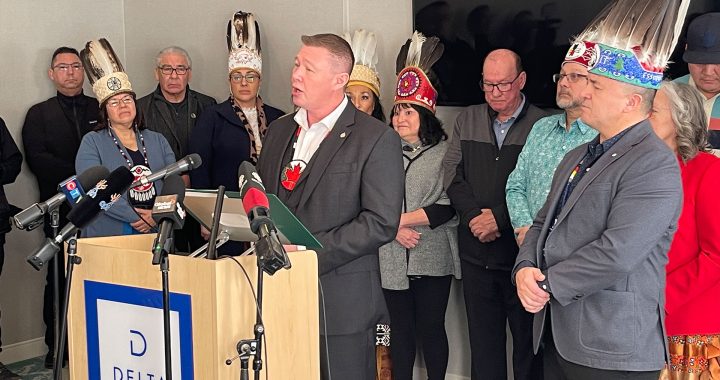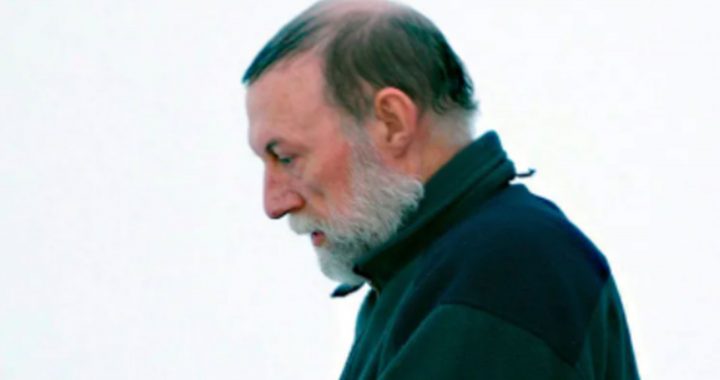
Photo: Justin Brake/APTN.
Jane Philpott’s resignation Monday as Treasury Board president will have implications for Indigenous peoples and Indigenous-related federal policies and funding, according to some Indigenous leaders.
Philpott, who was named Treasury Board president in a Cabinet shuffle in January, announced her resignation in a letter Monday, citing “lost confidence” in how the government has handled events surrounding the SNC-Lavalin controversy, which Philpott noted “have shaken the federal government.”
Indigenous and federal opposition leaders were quick to respond to the Trudeau cabinet’s loss of a minister widely regarded as an Indigenous ally and a decision-maker committed to seeing through policy and legislative reform on Indigenous files.
Assembly of First Nations B.C. Regional Chief Terry Teegee told APTN News that Philpott quickly earned First Nations leaders’ trust and support when she was appointed minister of Indigenous services in August 2017.
Teegee said he lost confidence in the Trudeau government’s commitment to reconciliation when Jody Wilson-Raybould was removed from her role as justice minister as attorney general, and when Philpott was shuffled out of Indigenous services, in Janary.
Now, Philpott’s resignation “solidifies that concern, in terms of not only the confidence in Trudeau’s leadership, but also in the [Liberal] Party.”
Teegee expressed his disappointment during a meeting with Trudeau in January, other First Nation leaders met with Trudeau in January, he said, “but perhaps now more than ever…I felt we [are] no longer a priority.”
Inuit Tapiriit Kanatami (ITK) President Natan Obed said in a statement to APTN Monday that he’s “saddened to learn she has resigned from cabinet,” explaining ITK had a “productive working relationship” with Philpott, particularly on the issues of suicide prevention, tuberculosis elimination, child welfare and the Inuit-Crown Partnership Committee.
“[O]ur work with the federal government is ongoing,” Obed said, and I look forward to forming an effective relationship with her successor at Treasury Board.”
Grand Chief Stewart Phillip of the Union of B.C. Indian Chiefs said Philpott’s resignation shows the Trudeau government “is in a precarious situation, and I think the entire country is beginning to wonder what kind of impact this will have on the national interest for everybody in the country.”
Phillip joined Conservative leader Andrew Scheer in calling for Trudeau’s resignation, and also echoed NDP leader Jagmeet Sing’s demand for a public inquiry into the SNC controversy.
But not all who praised Philpott’s work on Indigenous policies and legislation are supporting her decision to leave cabinet.
Metis National Council Vice President David Chartrand is questioning Philpott’s prior commitments to Indigenous people on key issues like child welfare.
In her role as Treasury Board president, Phiilpott would have overseen funding for the implementation of Bill C-92 if the new Indigenous child and family services is passed into law later this year.
Even current Indigenous Services Minister Seamus O’Regan, during last Thursday’s announcement of the new legislation, noted Philpott’s role in funding the child welfare changes.
Chartrand, who is also President of the Manitoba Metis Federation, said Philpott’s resignation as Treasury Board president could hurt Metis.
“I have to ask myself the question: why would you walk away from unfinished business,” he said, adding Philpott “promised there would be lasting change.”
“The Treasury Board sets the parameters of how resources will be extended and how outcomes will be expected to be achieved,” he said, adding the board “sometimes…puts so many blockages that you can’t even do anything with these types of opportunities that come your way.
“So for me, she was going to be able to do the full circle approach…to make change for the better and for the continuation of making sure children are protected from ever being abused again.”
Philpott outlined a number of reasons for leaving Cabinet.
“It grieves me to leave a portfolio where I was at work to deliver on an important mandate,” Philpott said in her resignation letter.
“But I must abide by my core values, my ethical responsibilities and constitutional obligations.
“There can be a cost to acting on one’s principles, but there is a bigger cost to abandoning them,” she wrote.
Wilson-Raybould took to Twitter to support Philpott’s decision.
“For almost 4 years our country has witnessed your constant & unassailable commitment to always doing what is right & best for Cdns,” she said.
To the incomparable , truly the #MOC…For almost 4 years our country has witnessed your constant & unassailable commitment to always doing what is right & best for Cdns. You are a leader of vision & strength & I look forward to continuing to work alongside you. ❤️U. pic.twitter.com/bwL6ouQjSA
— Jody Wilson-Raybould () March 4, 2019
“You are a leader of vision & strength & I look forward to continuing to work alongside you.”
Similar to Wilson-Raybould, Philpott did not announce any intentions of leaving the Liberal Party or resigning her seat in Parliament.
In a statement Monday, O’Regan thanked Philpott for her services and said her leadership “helped shape and advance critical initiatives in the new department—work that I continue in my role as Minister.”
O’Regan said he has “full confidence” in Trudeau and that he is “committed to continuing on with the important work ahead for Indigenous peoples and all Canadians.”
Crown-Indigenous Relations Minister Carolyn Bennett also expressed her support for her embattled leader and party, saying she has “absolute confidence in our government, and our Prime Minister, and will continue the vital work of advancing reconciliation and self-determination as the Minister of Crown-Indigenous Relations.”
Others aren’t as optimistic.
“Now I know the Libs are really in big trouble,” former Manitoba Keewatinowi Okimakanak Grand Chief Sheila North Tweeted Monday, adding Philpott “was the main person I had a tremendous respect for in government.”
Mary Ellen Turpel-Lafond, a law professor at University of British Columbia and Director of the university’s Residential School History and Dialogue Centre, called Philpott’s resignation “sad and unfortunate”.
“She produced some pretty remarkable progress, particularly on child welfare, where she took a unity-seeking approach,” Turpel-Lafond told APTN.
“She had a deep understanding of a very complex issue, and she was able to push it toward a clear path for funding and solutions.
Trudeau was interrupted and heckled during a climate change rally in Toronto Monday evening.
He thanked Philpott for her work and credited her with leading “transformational change” on several files.
But NDP MP Charlie Angus called the former senior cabinet minister’s resignation “a watershed moment” for the Trudeau government.
“It is a sad day for Canada to lose a minister with such integrity,” he said in a Tweet Monday. “Nobody in government has done more to push reconciliation than Ms. Philpott. I have upmost respect for her.”
Liberal MP Celina Caesar-Chavannes, who announced over the weekend she would not be running for her Whitby, Ont. seat in the fall election, Tweeted her support for Philpott Monday.
Caesar-Chavannes, who said her own decision to leave the Liberals was not related to the SNC controversy, alluded to Trudeau’s 2015 promise of gender parity in his cabinet.
“When you add women, please do not expect the status quo,” she said.
“Expect us to make correct decisions, stand for what is right and exit when values are compromised.”










